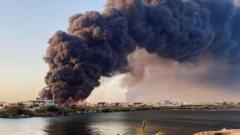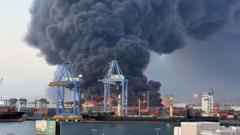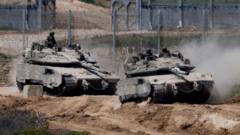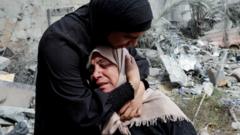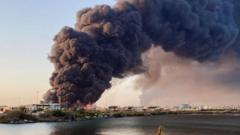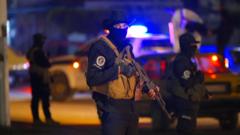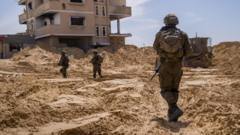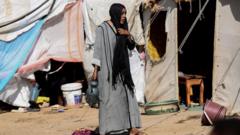In this harrowing account, individuals from el-Fasher, a city besieged during Sudan's civil war, share their stories of survival and loss. With access to smuggled phones, residents document their struggles against relentless violence, hunger, and the looming threat of atrocities. As the humanitarian crisis deepens, the resilience of these voices highlights the ongoing battle for survival amidst overwhelming despair.
Inside the Siege: Life Amidst Despair in El-Fasher, Sudan

Inside the Siege: Life Amidst Despair in El-Fasher, Sudan
As Sudan's civil war rages on, the plight of el-Fasher's residents is captured through smuggled phones, showcasing the devastating impacts of hunger, fear, and loss.
In el-Fasher, Sudan, the horrors of civil war have transformed daily life into a brutal struggle for survival. A recent report reveals the power of smuggled phones, which have allowed some residents to share their harrowing experiences amid constant bombardment and a dwindling supply of food and resources.
Hafiza, a 21-year-old woman, mourns the loss of her mother who was killed by a shell while working at a local market in August 2024. She has now taken on the responsibility of caring for her siblings in a city that has been besieged for over a year. With their father deceased before the outbreak of war, Hafiza now finds herself alone in her fight to provide for her family. "Grief is very difficult," she confesses through one of her video messages, revealing the emotional toll of living in fear as violence engulfs her hometown.
As the conflict in Sudan unfolds, with the military battling the paramilitary Rapid Support Forces (RSF), el-Fasher remains one of the last major cities under military control. The siege has cut off access to journalists, making it difficult to deliver information about the humanitarian crisis. In this climate, Hafiza has turned to volunteering, distributing food and blankets to those displaced in tiny shelters around the city.
Mostafa, another resident who received one of the smuggled phones, captures the relentless artillery shelling that plagues his community. "There is no safe place in el-Fasher," he states, vividly illustrating the horrors of life under siege. Mostafa volunteers at a shelter for displaced people, documenting the terrifying moments as attacks disrupt their efforts to provide aid.
Manahel, who also volunteers at community kitchens, recounts the devastating impact of the war. Together with Mostafa, she prepares meals that often represent the only nourishment many will receive in a day. "Every family is equal now," she explains, highlighting how the fight has obliterated class distinctions, leaving everyone in dire need.
The situation is exacerbated by fears that violent crime, particularly against women, may increase should the RSF seize control of the city. Hafiza explicitly expresses her concerns, aware of the brutalities reported in surrounding areas previously captured by the RSF. In a damning narrative, these accounts cast a shadow on the RSF's claims of order following their conquests.
In stark contrast, officials like Tijani Karshoum, the governor of West Darfur, maintain that life in cities like el-Geneina, previously afflicted by violence and atrocities, has returned to normalcy. However, reports from refugees tell a different story, illustrating the disconnect between the narrative of those in power and the lived realities of displaced civilians.
As the conflict continues to unfold, each passing day erodes hope within the besieged walls of el-Fasher. In November 2024, both Hafiza and Mostafa ultimately made the difficult decision to leave the city in search of safety and a chance at survival, voicing their fears and uncertainty about the future. "We are leaving without knowing our fate," Manahel reflects, echoing the collective anxiety that shadows each displaced family.
Amidst this ongoing humanitarian crisis, the poignant stories of resilience, desperation, and the fight for survival challenge the narrative of peace touted by those in power, illustrating the urgent need for global attention and humanitarian support for a region in turmoil.







